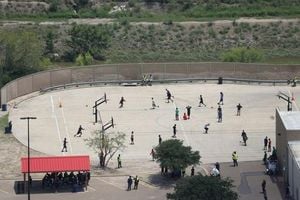India's medical community faced another dark chapter as doctors initiated a nationwide strike on Saturday, protesting the tragic incident of the alleged rape and murder of their colleague, Moumita Debnath. The Indian Medical Association (IMA) organized this strike, emphasizing the urgent need for safer working conditions for medical professionals.
Debnath, only 31 years old, was found dead on August 9 at the R.G. Kar Medical College and Hospital, where she was training as a doctor. Her body was discovered bloodied inside the seminar hall, raising immediate concern and outrage within the medical community and beyond.
The police quickly detained a volunteer working at the hospital, linking him to the case, but the victim's family alleged involvement of multiple assailants, hinting at the possibility of gang rape. An autopsy confirmed signs of sexual assault, leading to federal authorities taking over the investigation amid accusations of local governmental misconduct.
On Wednesday, the situation escalated dramatically as thousands of women took to the streets across India. Many participants engaged in “Reclaim The Night” marches, vocally demanding justice for Debnath and stronger protective measures for all women.
The protests, rooted deeply within the sentiments of the public, highlighted the pervasive vulnerability faced by female doctors and medics. The IMA called for not just justice for Debnath, but for systemic changes to improve the conditions under which medical professionals operate, particularly women.
Doctors across the nation have pushed aside non-essential procedures as they stand united against what they describe as alarming neglect for their safety. Recent statistics show this isn’t just about Debnath; it’s part of broader concerns about the growing violence against medical professionals, particularly women, within the healthcare system.
“The entire medical fraternity of India is shocked beyond words at the brutal murder of Ms. Moumita Debnath,” voiced Dr. Anilkumar Nayak, IMA secretary-general. His condemning remarks pointed to the existing climate of fear experienced by professionals within their own workplaces.
This latest tragedy follows recent violent episodes targeting female medical workers, including the stabbing death of another young doctor. These events have intensified calls for immediate action and change from both the medical community and civil society.
With cries for justice echoing loud and clear, citizens demanded accountability from authorities, not only for the loss of life but for creating environments allowing such tragedies to occur. The IMA has firmly stated the need for comprehensive investigations to expose the failures at multiple levels, including those surrounding safety protocols for medics.
The haunting reality of sexual violence against women is not new to India, where the public response to such incidents is often complicated by social stigmas. Activists highlighted the difficulty many victims face when reporting crimes, rooting the broader systemic issues within societal norms plagued by shame and mistrust of law enforcement.
A stark increase of 20% was noted by the National Crime Records Bureau, which reported 31,516 rapes recorded last year alone. This alarming statistic forms the backdrop to the national discourse on women's safety and rights.
The IMA has urged society at large to support the call for justice, framing the incident as emblematic of wider cultural failures. Debnath’s death not only represents the loss of life but speaks to the urgent necessity to establish secure spaces for medical professionals, particularly women, throughout India.
India's history has shown the severity of violent crimes against women has spurred public protests and legislative reforms. The tragic gang rape and murder of a young woman on a bus in 2012 ignited national outrage and brought reformative changes aimed at stricter penalties for sexual offenders.
Change has occurred, but not at the pace needed, and the public is growing weary of these cyclical displays of violence. The Indian Medical Association's response aims to hold authorities accountable and instigate necessary reforms to protect medical professionals more effectively.
Dr. Nayak reiterated the responsibility of authorities to improve safety measures, citing the urgent need for laws to criminalize attacks against on-duty medics without bail options. The cultural shift needed to protect women and those serving them must move beyond legislation to fundamentally altering workplace environments.
The current outrage surrounding Debnath's case has united voices across multiple sectors, indicating the nation's impatience for change. The growing collective protest highlights community demands for systemic reform to guarantee safety, respect, and dignity for all, especially within the medical fields.
This tragic incident serves to illuminate how far India still has to go to address and dismantle the systemic issues surrounding gender-based violence and workplace safety. What is deeply needed is not just the resolution of one tragic case, but the commitment to honour the lives lost by instituting comprehensive, long-lasting change.
Onlookers worldwide watch as India's response will shape the future of healthcare and safety for medical professionals. The IMA's actions mark the beginning of what could lead toward catalyzing significant legislative and societal changes – reinforcing the imperative for women to work and train safely without fear of violence.
The outpouring of grief and anger from the medical community reflects broader societal concerns surrounding women's safety. Each protest and voice raised adds weight to the urgency of creating not only safer hospitals but also healthier societal attitudes toward violence against women.



